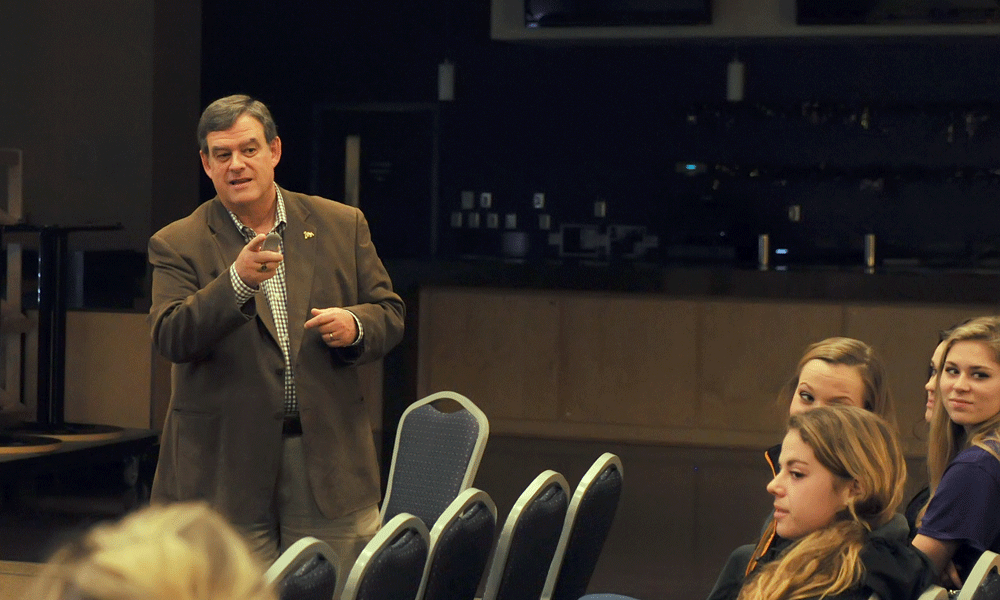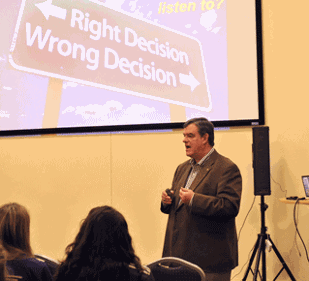The good, the bad, and the downright dangerous
Science and Technology
SUMMARY: Joe Showker's ('79) technology prowess, his reputation as an educator and his bent for innovation quickly made him the go-to person on Internet safety. With the advent of smartphones, external drives, thumb drives and social media, Internet safety shifted from predators to privacy and reputation damage, and his focus pivoted with it.
From the Spring/Summer 2016 print issue of Madison.
Seeing potential
As Joe Showker (’79) walked onto the stage at Clarke County Middle School, students were fidgeting, chatting, laughing, texting and checking smartphones.
Suddenly, you could hear a pin drop as Showker ticked off personal information about individual students. The retired teacher and coach had their attention—and he was telling truths they needed to hear.
In the mid-1980s, before cellphones were ubiquitous and the Internet was indispensable, Showker recognized technology’s impact on education. “I became a student of the industry,” he says.
He was producing a school newsletter on an old floppy-disk system when the principal approached him about teaching this “new” technology. Showker’s response was instantaneous: “Yeah, I’d love to.”
“We repurposed an old science room with a bunch of Apple II computers,” he says. From these makeshift beginnings, Showker developed and taught the first full-year computer literacy course in Rockingham County Public Schools and with several colleagues created a training manual for teachers.
“All great inventors,” he says, “are looking for the widget that makes something work better. Everything I did in my computer class was to help those kids use that tool called the computer in a better way.”
Adopting Showker’s vision, RCPS created a countywide curriculum for computer literacy.
“For several years, that was the norm in Rockingham County. We were producing kids in middle school who were more [computer-] literate than collegians at JMU.” Showker wasn’t alone. His wife, Debbie (’78), also an innovator, set up the first computer lab at Keezletown Elementary School and taught computer literacy at the elementary level before anyone else in the county. In short order, she says, “The kids I got were cutting their teeth on a mouse.”
The Internet’s darker side
Showker soon realized that the burgeoning Internet was a double-edged sword—many positives, but also inherent dangers. A middle-school parent himself at the time, he says, “I remember thinking, this is something I need to care about.”
When he came across an online game called “Missing” that introduced the concept of Internet predators, he brought the game and its creator to Rockingham County to spread the potentially life-saving knowledge. Showker’s school, Montevideo Middle School, was the first school in the Southeast to use the game.
Showker’s technology prowess, his reputation as an educator, and his bent for innovation quickly made him the go-to person on Internet safety. He spoke on Capitol Hill, and he worked with lobbyists, parent-teacher organizations, schools, civic groups, police departments and the media. His approach was “pervasive,” he says. Training covered not only parents and teachers, but everyone, including cafeteria staff.
Showker was tapped by then-Attorney General Bob McDonnell for a task force that worked with the state Department of Education to write “Guidelines and Resources for Internet Safety in Virginia Schools.” It became the first Internet safety curriculum in the nation.
In addition, Showker says, “Virginia was the first state to mandate Internet safety instruction in public schools.” For his leadership, Showker was recognized by Rep. Bob Goodlatte, chairman of the House Judiciary committee, with a Children’s Champion Award in 2006.
Pivoting again
As students became more familiar with technology, the danger changed—and once again, Showker was on the front line. With the advent of smartphones, external drives, thumb drives and social media, Internet safety shifted from predators to privacy and reputation damage—and his focus pivoted with it.
“Statistics tell us that 95 percent of all interactions with youth and adults that are inappropriate, the youth fully knows what they’re doing,” he says. “Students could easily figure out who the ‘creepers’ were. …The nature of the learner changed.
“My presentations went from Internet safety to digital ethics when the youth became so good [at technology],” he says. “Digital ethics is the evolution of Internet safety.” He cites hackers accessing financial information, identity theft and digital crime, but he comes down hardest on students for their potential to ruin their futures by sullying their reputations. Now he regularly tells students, “the biggest predator trolling today’s Internet is sitting in your seat. …The whole ethical thing is that you’ve got to do the right thing or you are at risk.”

But how does one convince fearless, tech-savvy students? “I literally shock them by showing them how vulnerable they are by what they’ve put online,” he says.
At Clarke County, he found the school’s most popular Twitter account and tapped into feeds of dozens of other students who—unknowingly—had broadcast their lives for anyone and everyone to see.
Ensuring Internet privacy is a broad challenge, he says, especially with location apps on most smartphones. Such unsecured information allows hackers to steal private information or even pick you out of a crowd. Showker’s clarion call is that students must take charge of their own Internet presence.
Showker frequently takes his message of digital ethics to JMU sports teams—often at a coach’s behest. As a former collegiate athlete, he understands that athletes are held to a higher standard and that their conduct online and elsewhere reflects on the university as well as themselves. Through presentations he makes throughout the country, the now-retired Showker has reached more than 32,000 people, a figure that grows weekly. He also maintains a quarterly online journal, reaching thousands more.
“The ultimate teaching tool,” the 36-year veteran teacher knows, “is a tool that reaches out and grabs the learner and influences their behavior or gives them content which they retain.”
And in Showker’s case, it keeps them safe.
